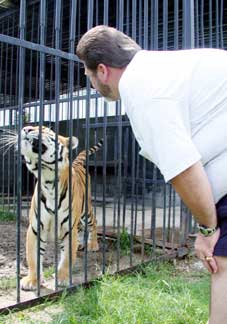Tiger Truck Stop has been involved in a controversy over treatment and exhibition of Bengal tigers at the Gross Tete truck stop, but owner and president Michael Sandlin said many of the accusations are false.
Sandlin gave three of his four tigers to Tiger Haven, a Tennessee tiger sanctuary earlier this month. He said the United States Drug Administration put unexpected pressure on him to release at least two tigers after the agency accused him of four violations.
The USDA faulted Tiger Truck Stop for failing to write a program of veterinary care, failure to handle young tiger cubs, failure to keep facility structure sound and failure to have adequate training for employees to care for the tigers.
“We denied all four citations, and we actually proved three of the four to be false,” Sandlin said. “They threatened to take legal action against us, and we felt in our best interest to keep this from going court.”
He said the USDA wanted him to give up his license for keeping the tigers and pay a $5,000 fine for mistreatment. Sandlin said he wanted to avoid this, so he agreed to their demands and to give up at least two tigers and also to repair the tigers’ living quarters.
“The exhibit needed repairs, but we never conceded to claims that it wasn’t sound enough for the tigers,” Sandlin said.
Shannon Gonsoulin, Tiger Truck Stop veterinarian from All Creatures Veterinary Hospital in New Iberia, sent a document to the USDA after a March 27, 2002, inspection explaining why three of the four accusations were false.
Gonsoulin said changes would be made to the tigers’ living structures, but USDA officials never contacted him to prepare a veterinary care program. His own examinations of the tigers showed no signs of stress or disease, he added.
He also questioned the requirement to have “sufficient number of adequately trained employees to maintain a professionally acceptable level of husbandry.”
“Please let me know where there is a tiger training camp,” Gonsoulin said. “Excuse me for being sarcastic, but you know as well as I do that this type of care is found from experience only.”
He added that Sandlin agreed to send an employee to the Audubon Zoo in New Orleans to make rounds with a large cat keeper and learn more about caring for the tigers.
Cynthia Cash, a University alumna who was instrumental in getting the tigers released, said in a Sept. 19 Reveille article that she and fellow animal rights advocate Holly Reynolds thought the animals were “being treated in an inhumane way.”
Sandlin said this is not the case at all. He and his staff have always treated the tigers with care, he said.
“I think it’s a wonderful thing that they’re here,” he said. “The cubs are raised in the office and customers can pet them and help us feed them and care for them. The Advocate said it was ‘improper care,’ but I think they are very well taken care of.”
He said other accusations by Cash and the USDA that living conditions made Rainbow, an 18-year-old female tiger, extremely arthritic were exaggerated.
“I think [Rainbow] was arthritic because she was over 18 years old,” Sandlin said. “People that get really old start having trouble, and she’d had 13 cubs. These factors may have been part of what aggravated that, but it wasn’t the facility.”
Sandlin said he will repeat his practice of raising cubs and plans to raise more cubs in the near future. He also thinks many people misunderstand the difference between wild and domesticated tigers.
“I guess it would be cruel if we went to India and captured a tiger to display it here, but it would be just has cruel if you took Tony and released him in the wild in India,” he said. “The tigers became familiar with human affection. This is what they’re used to.”
Sam Winslow, general curator at the Baton Rouge Zoo, said the tigers at Tiger Truck Stop live in similar conditions as the University’s Mike the Tiger and tigers at the zoo.
He said Sandlin’s tigers would not survive in the wild. He said the zoo has hosted Tiger Truck Stop staff members for training on how to care for tigers, but the problem lies in the unstable employment of Sandlin’s staff.
Winslow said living conditions at the truck stop are sufficient enough for two tigers, which is what the USDA will allow Sandlin, but improvements still could be made.
“There are some heat issues with [the cages] being next to a big parking lot, and it would help to have a pool because tigers like water,” he said. “It could use some improvements, but so could our tiger quarters at the zoo. Mike [the Tiger] has more shade and a pool, but that’s the only difference.”
Tiger owner shares his version
September 23, 2003









